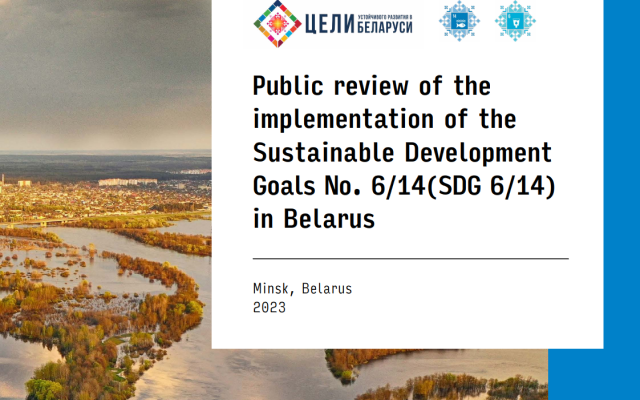
During the 2015 UN General Assembly all UN member countries adopted the 2030 Agenda for Sustainable Development, which committed to achieving 17 ambitious Sustainable Development Goals. Today humanity is in the middle of the path to achieving them. Unfortunately, numerous studies indicate that progress towards SDGs is not sufficient and, if the current pace continues, many of the goals will not be achieved. This, in particular, was discussed at the UN SDGs Summit held in September 2023.
In this regard, it is very important that every country could monitor the SDGs achievement at local level. It is even more important that researchers conducting this monitoring should be as objective as possible, which is best implemented in the format of public monitoring (review) of the process of the SDGs achievement.
In 2022-2023, a group of Belarusian experts prepared a series of reviews on various SDGs within the framework of the project “Institutional integration of the 2030 Agenda in Belarus and other Eastern Partnership countries”, implemented by the Dortmund International Education Center supported by the Federal Ministry of Economic Cooperation and Development (BMZ) and the German Society for International Cooperation (GIZ).
We bring to your attention a public review of the implementation of Sustainable Development Goals 6 “Ensure availability and sustainable management of water and sanitation for all” and 14 “Conserve and sustainably use the oceans, seas and marine resources for sustainable development” in the Republic of Belarus.
These goals were combined into one review to provide a comprehensive look at the area of water resources management in Belarus in the context of the SDGs. For Belarus, as a country that has a very large amount of water resources, this topic is very important. The review provides an analysis of general approaches to achieving SDG 6 and SDG 14, as well as an assessment of the implementation of individual objectives of these goals.
The authors of the publication note that the National Strategy for Water Resources Management in the Conditions of Climate Change for the period up to 2030 has been adopted and developed in Belarus. Various international organizations and projects have made significant contributions to the implementation of SDG 6. As an example, it is worth noting the Water Initiative+ (WIES+), implemented in Belarus with the support of the European Union, which helped in achieving many targets under SDG 6. A summary report on the situation and prospects for water resources management in the country was also released, which is perhaps one of the most important publications in recent years in this field.

Diagram 1. Nitrate content in wells in Belarus ((Including all non-centralized sources of water supply (wells, standpipes, boreholes, etc.)
Source: https://ecoidea.me/ru/article/1316
At the same time, according to the authors, despite Belarus’ significant progress in working on SDG 6, significant additional efforts are required to achieve them. In particular, the authors note a certain difference in access to safe drinking water for urban and rural populations. So in rural areas there is a problem of contamination of some wells with nitrates, low coverage of the population with centralized sewerage, etc.
To improve the situation, it is necessary to improve national strategic documents, modernize and develop water management systems and facilities, as well as strengthen interdepartmental interactions and develop transparency and accountability in decision-making on water resources management. An important element in making effective decisions on water resource management is the participation of the population and the public, which, in turn, requires good public awareness of the status of the issue.
In addition, for the successful implementation of many tasks within the framework of SDG 6 in Belarus, a constant analysis of similar processes occurring in the European Union and the Eurasian Economic Union is required, as well as the synchronization and implementation of the best-established regulatory practices.
Compared to SDG 6, SDG 14 is an atypical goal in the architecture of the Sustainable Development Goals in Belarus, as the dominant view is that the goals of this goal are relevant only for countries that have access to the sea. At the same time, the analysis shows that many tasks associated with this goal are directly related to Belarus.
According to experts, to improve the implementation of SDG 14 in Belarus, it is necessary to consider the inclusion of additional indicators in the national reporting system, since existing global indicators do not allow for a comprehensive and qualitative assessment of progress towards achieving SDG 14, especially for countries that do not have direct access to seas or oceans.
Key areas for efforts to achieve SDG 14 in Belarus could be: working with the problem of plastic and microplastics, reducing the load on water resources from the use of nitrogen in sensitive areas, developing capabilities for phosphorus capture at wastewater treatment plants, intensifying Belarusian participation in international marine and ocean initiatives and much more.
At the conclusion of the review, the authors prepared recommendations for improving the implementation of Sustainable Development Goals No. 6 and 14 in Belarus.
You can download the full text of the review from this link.
